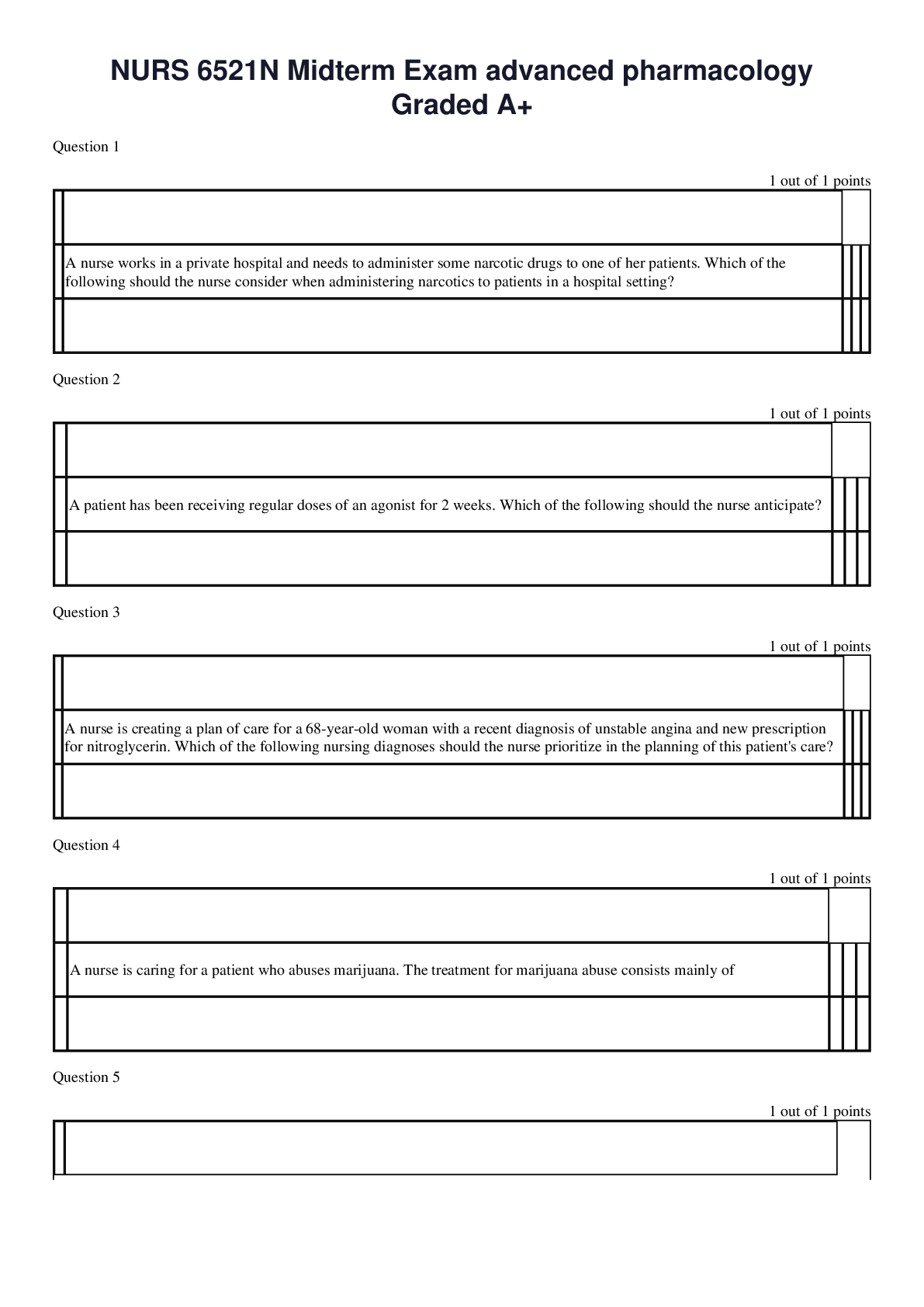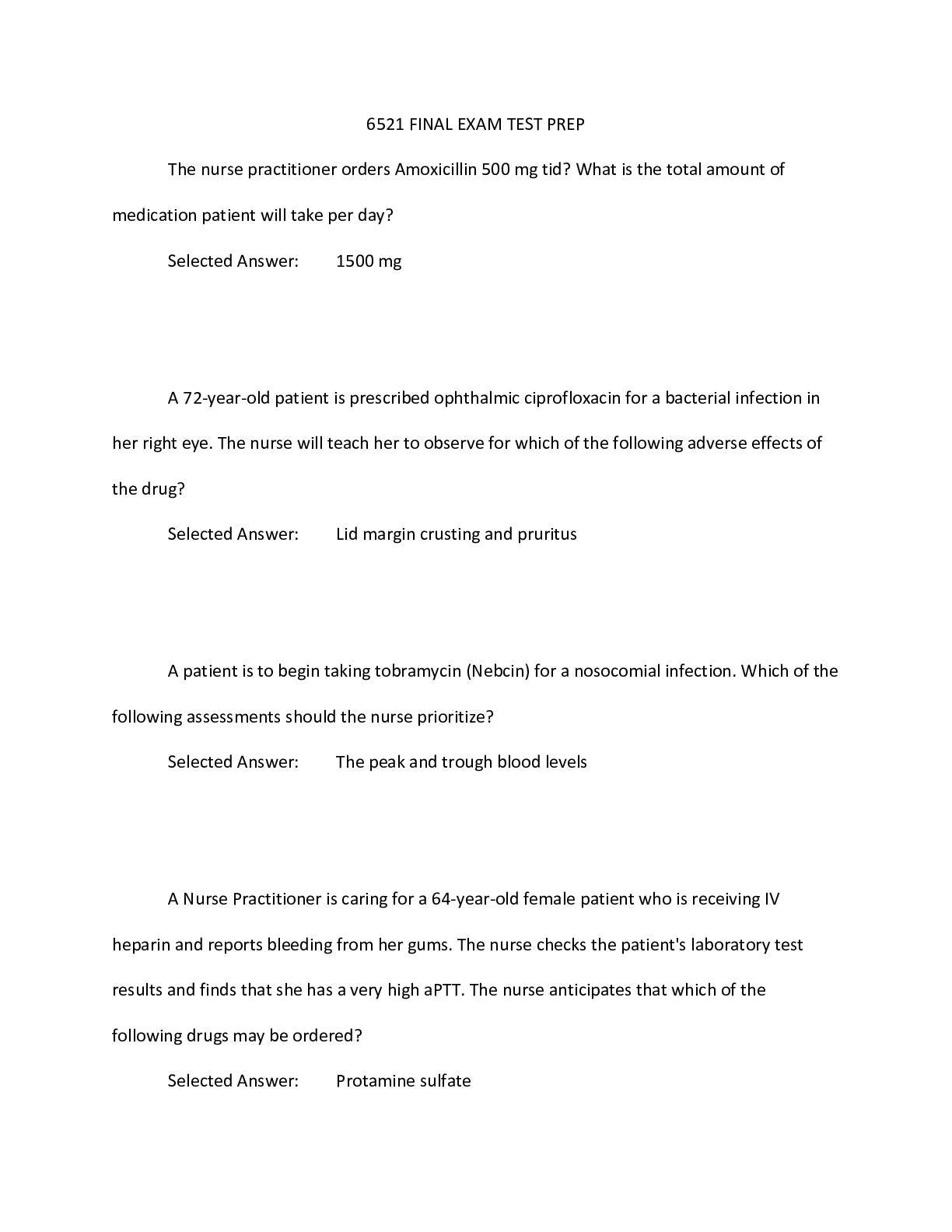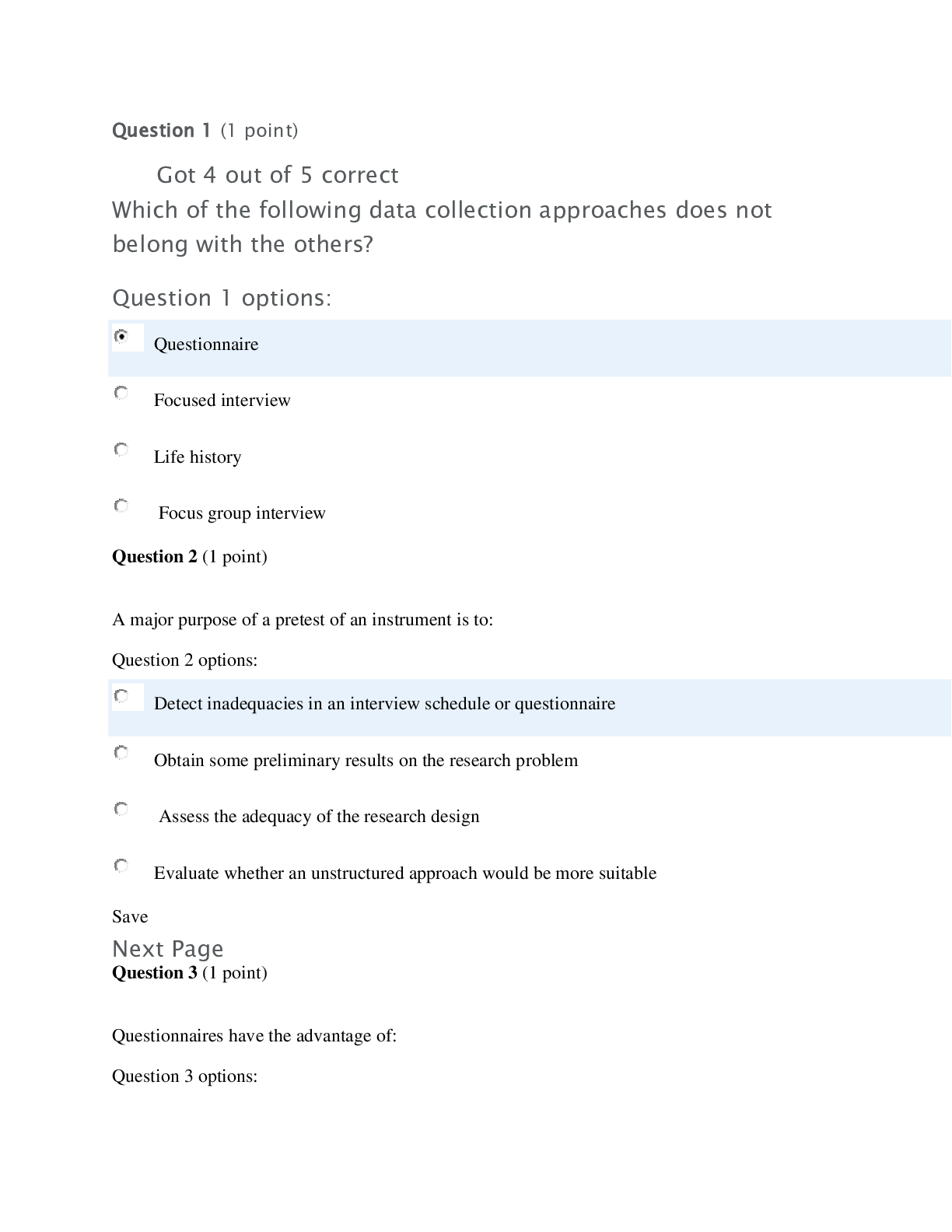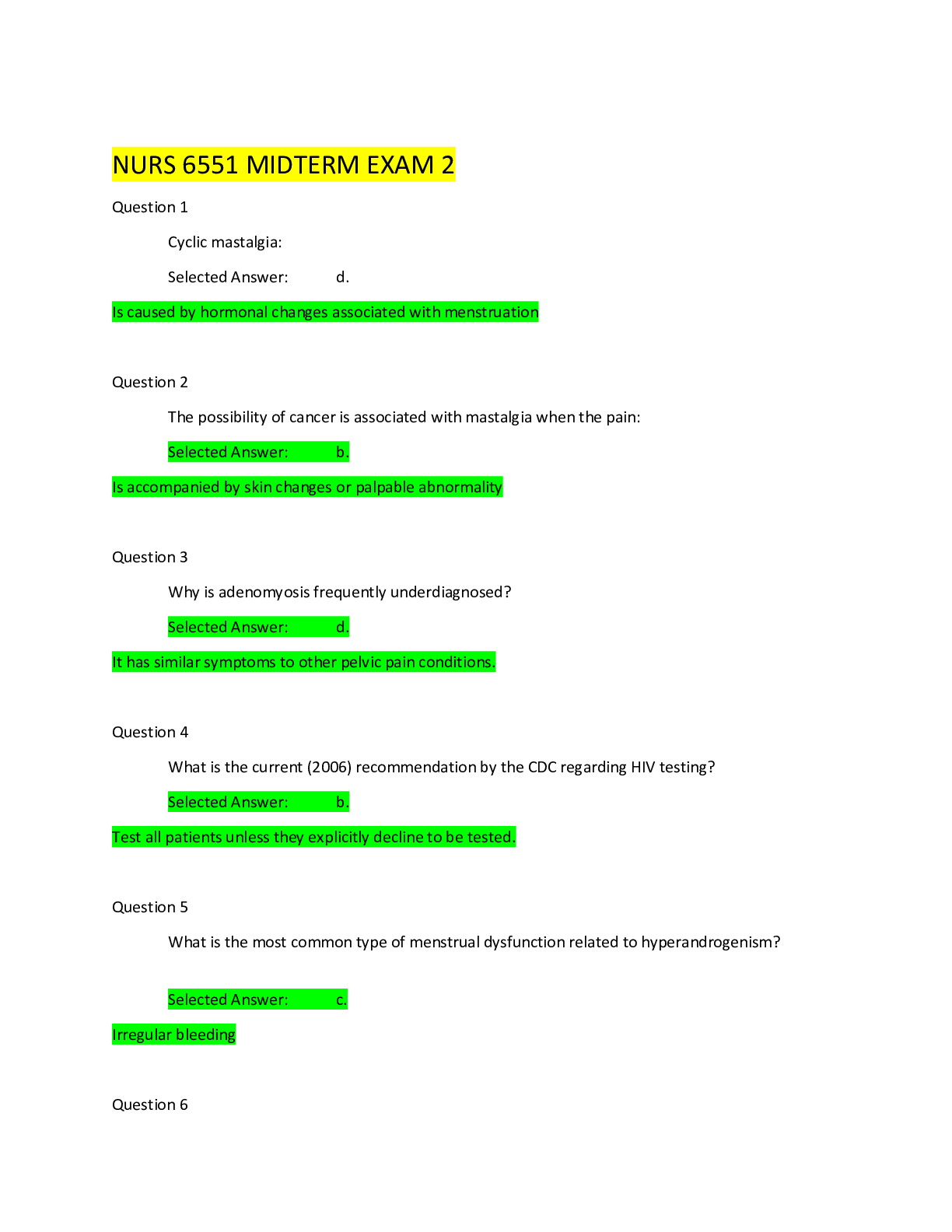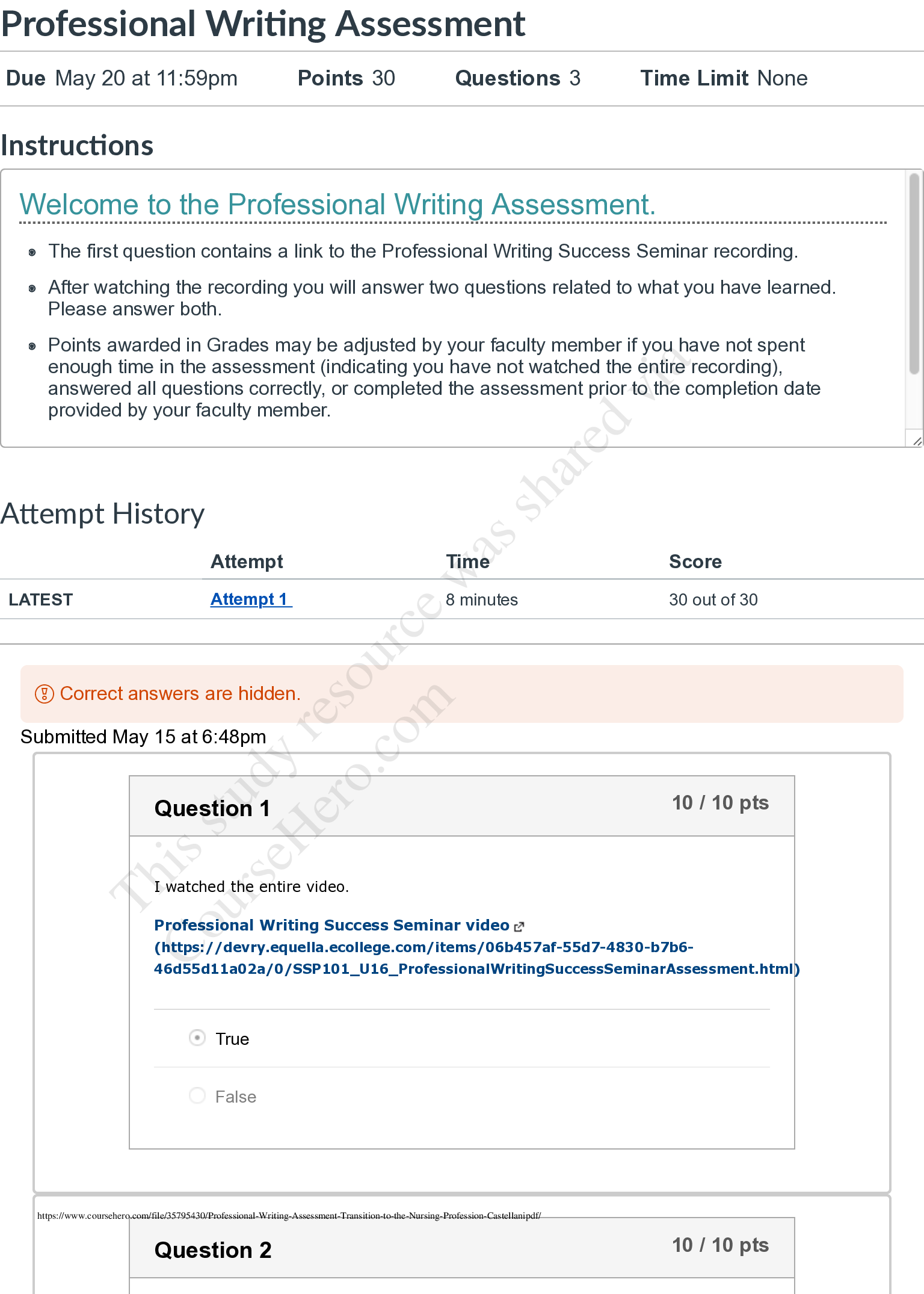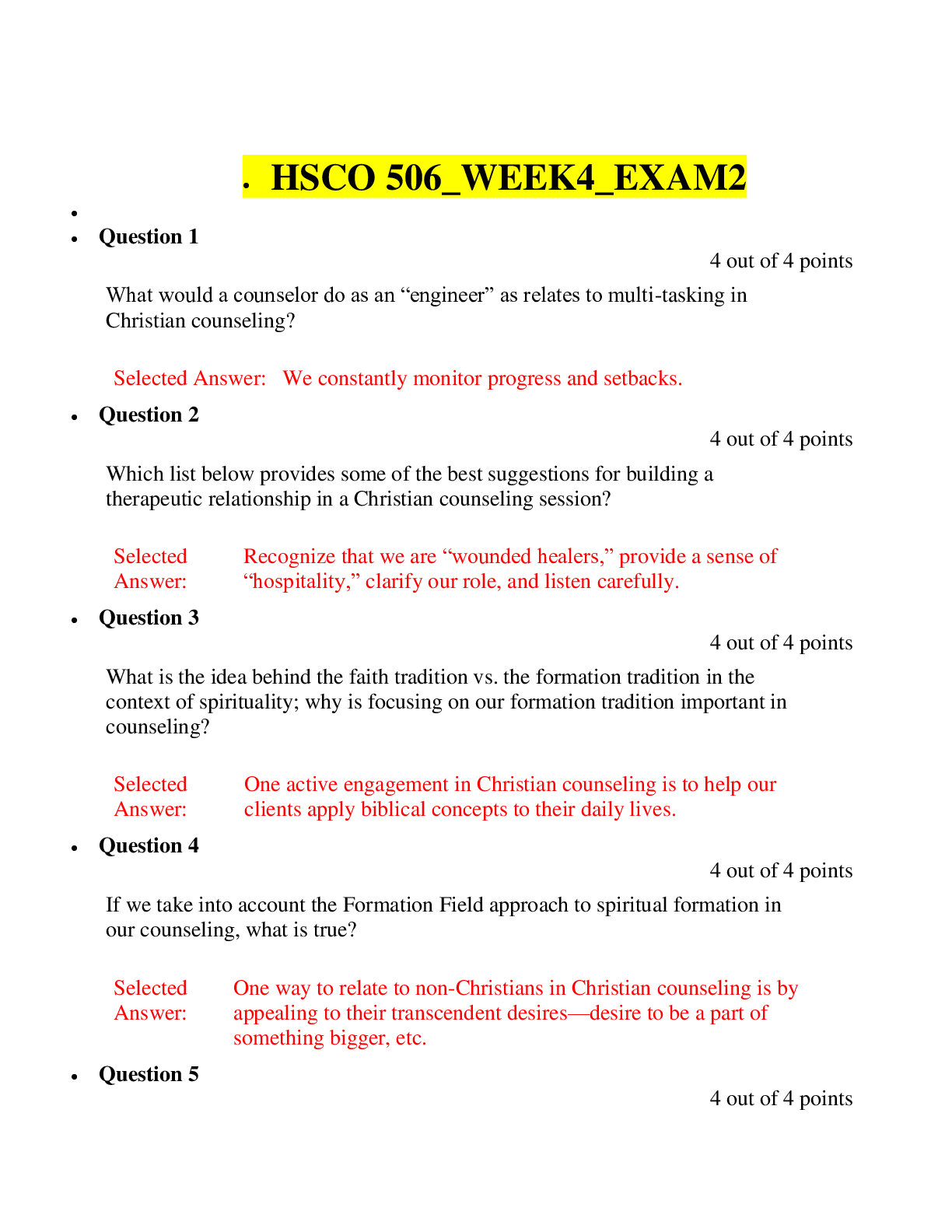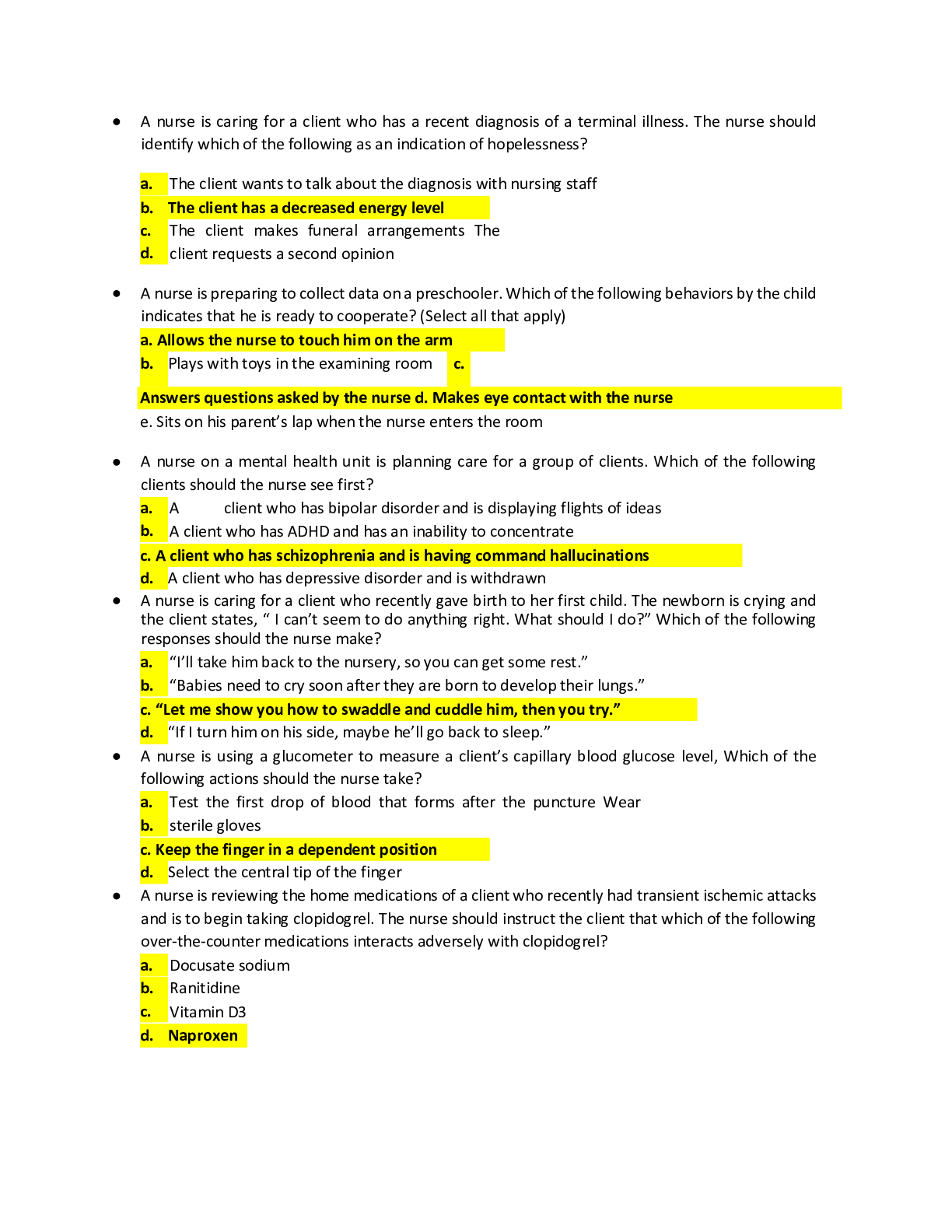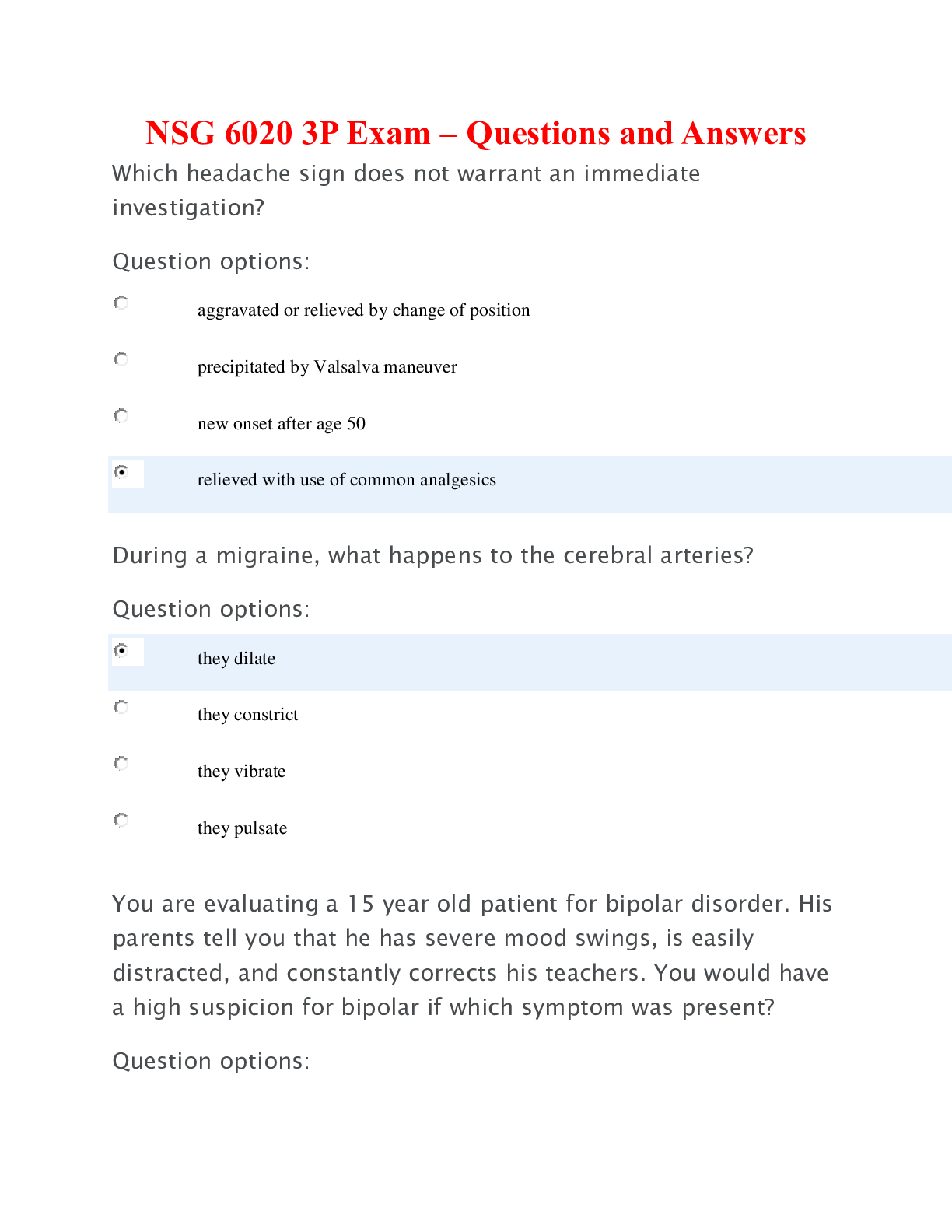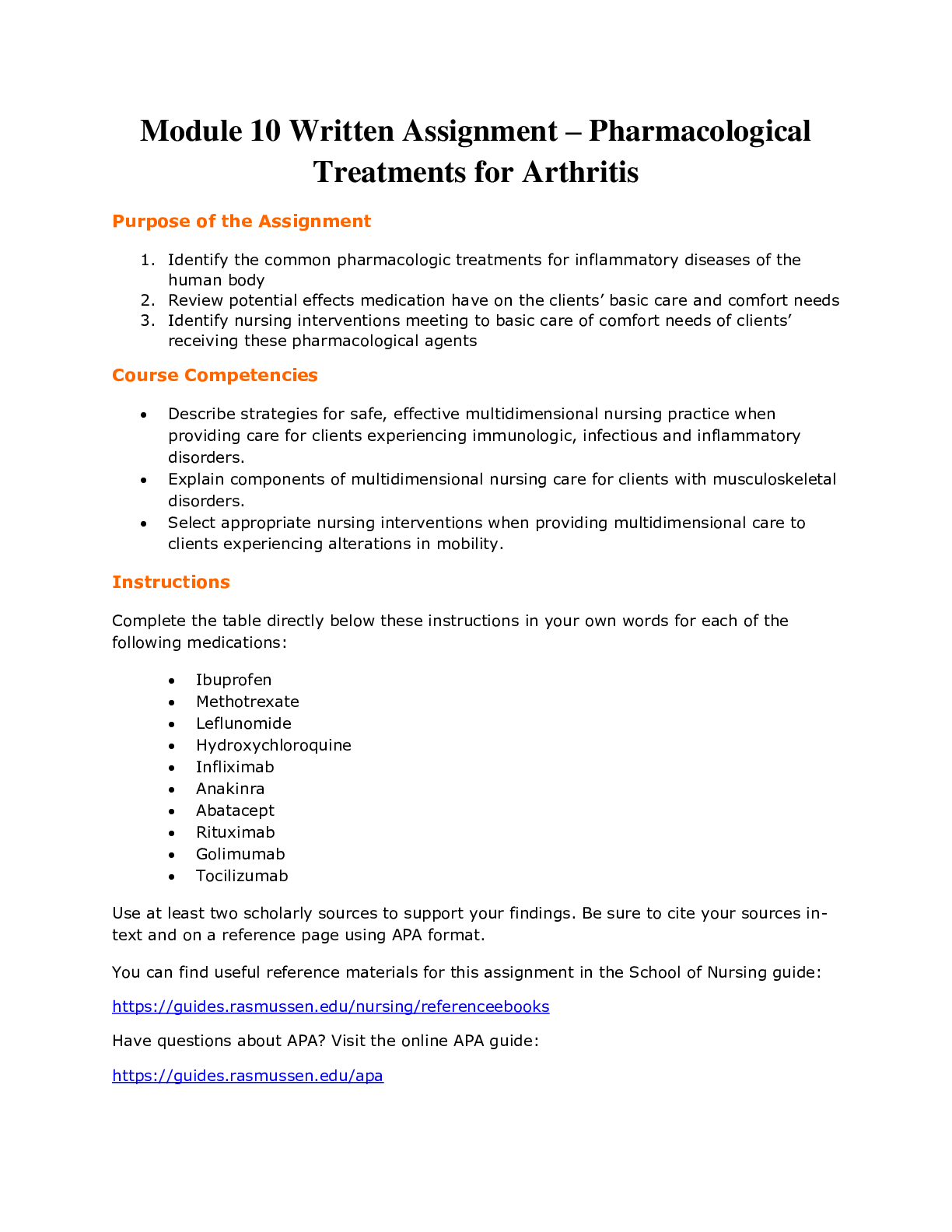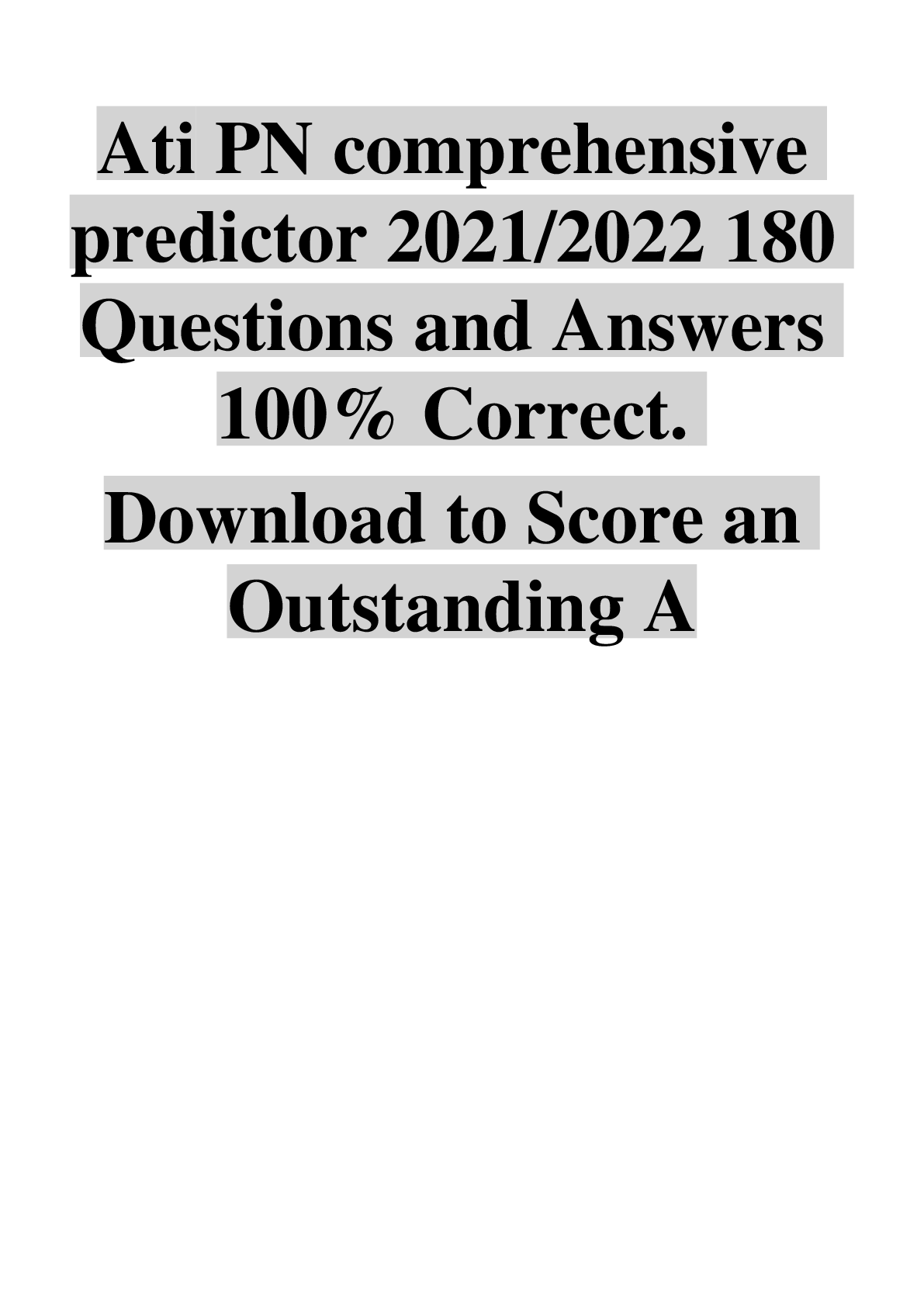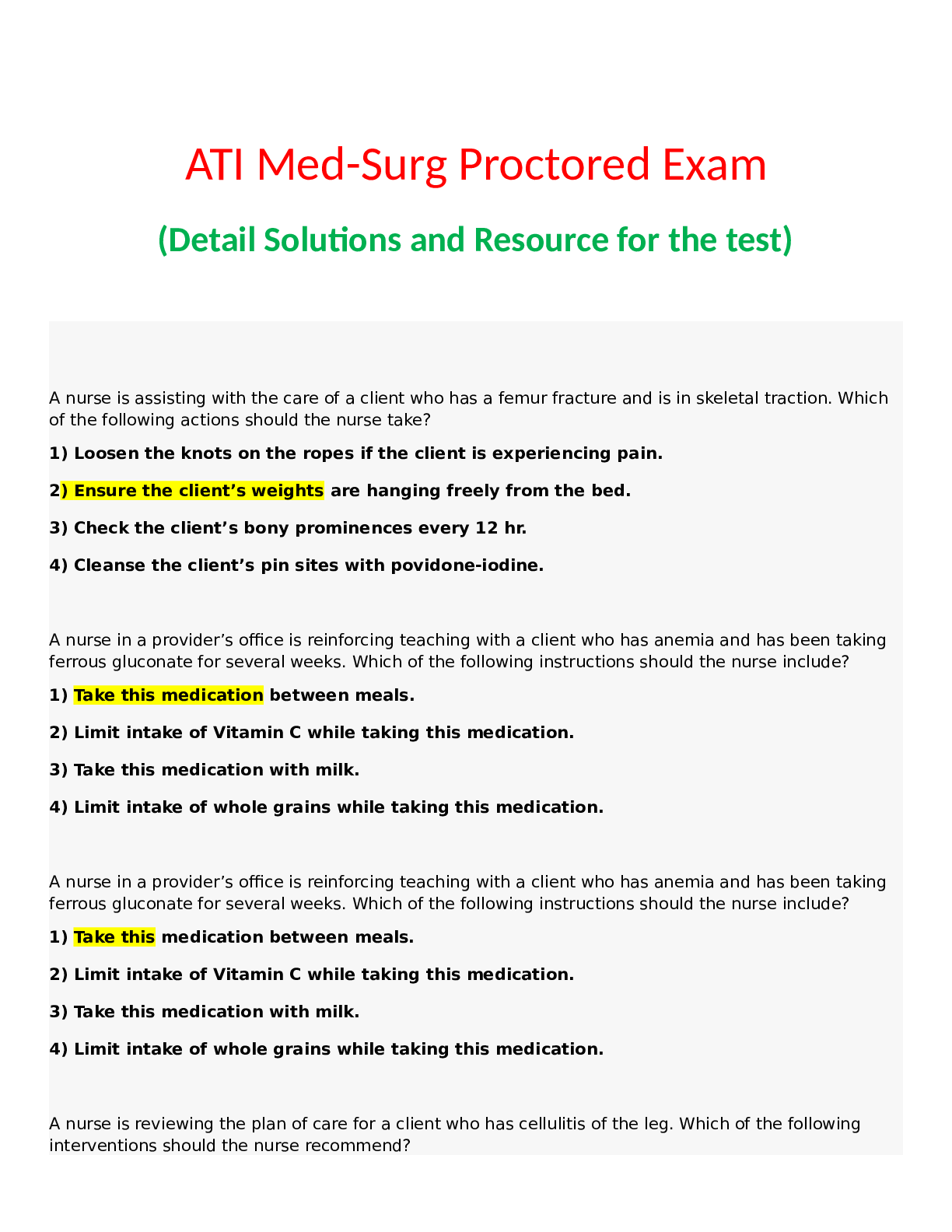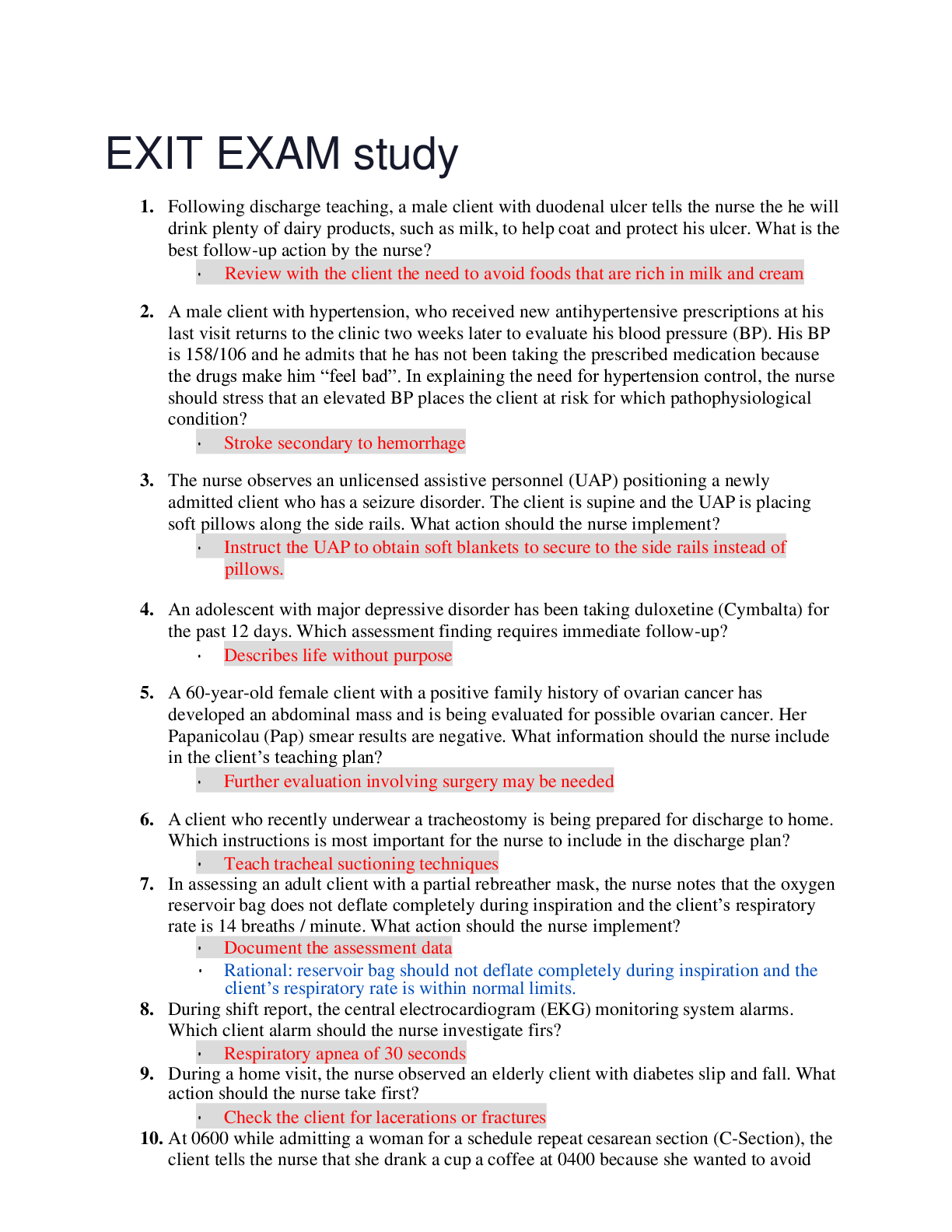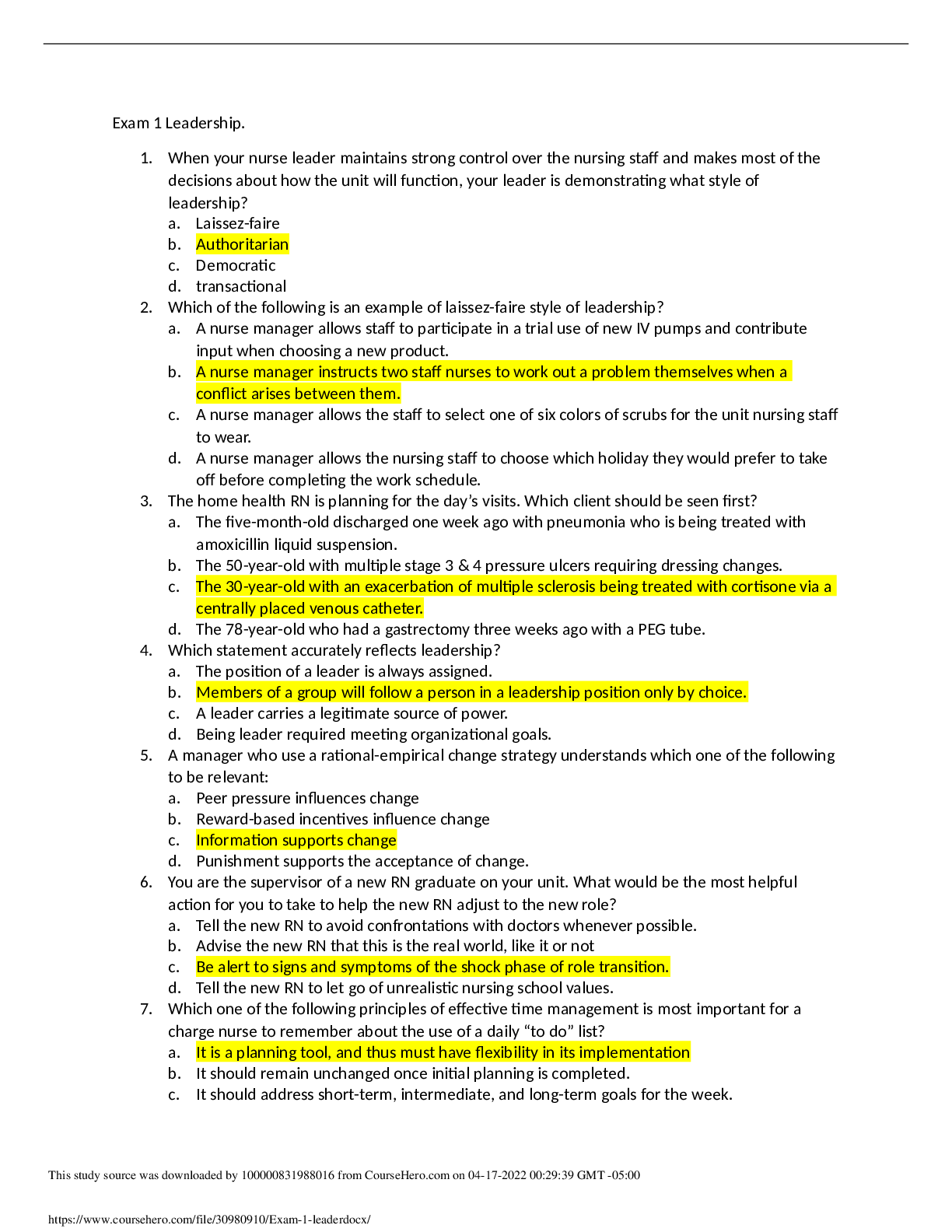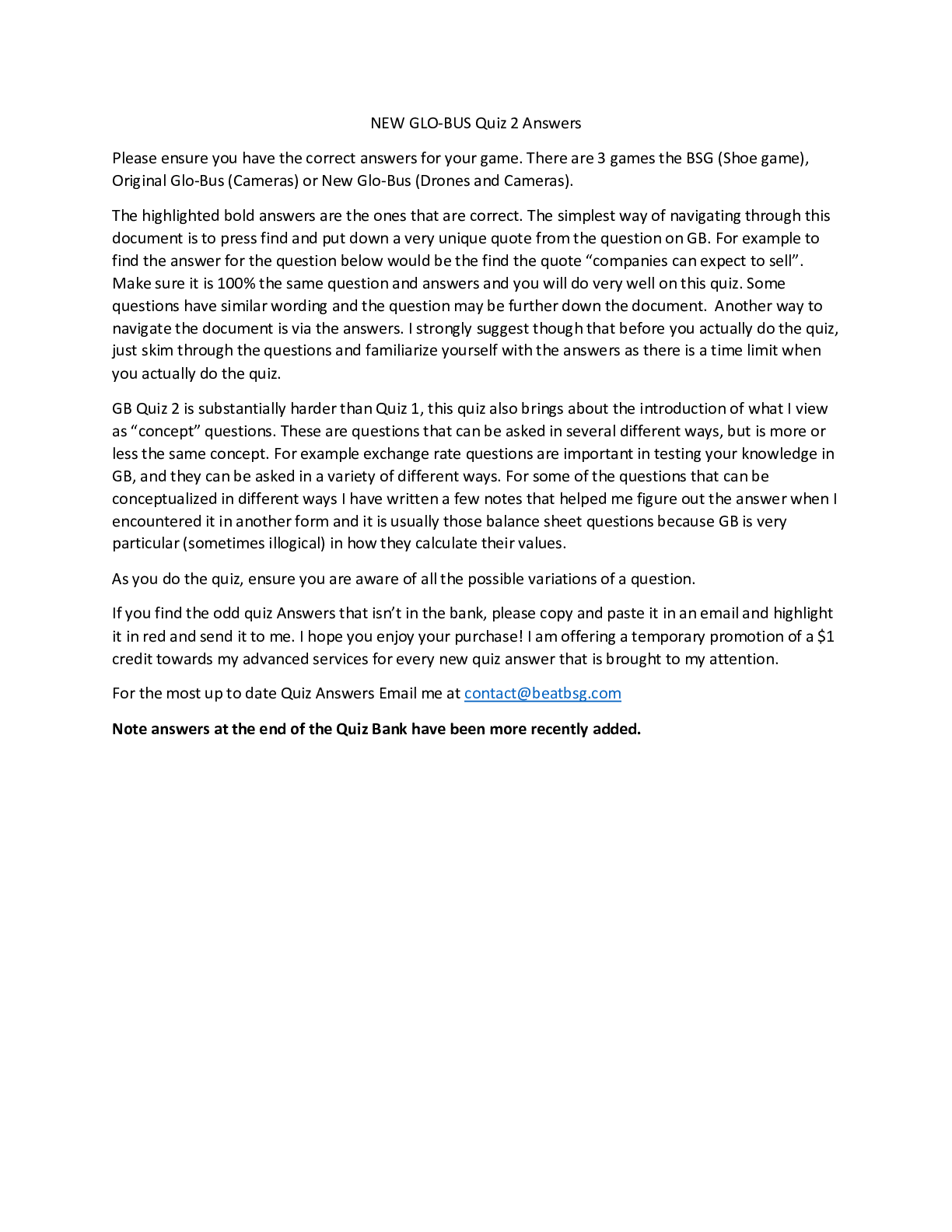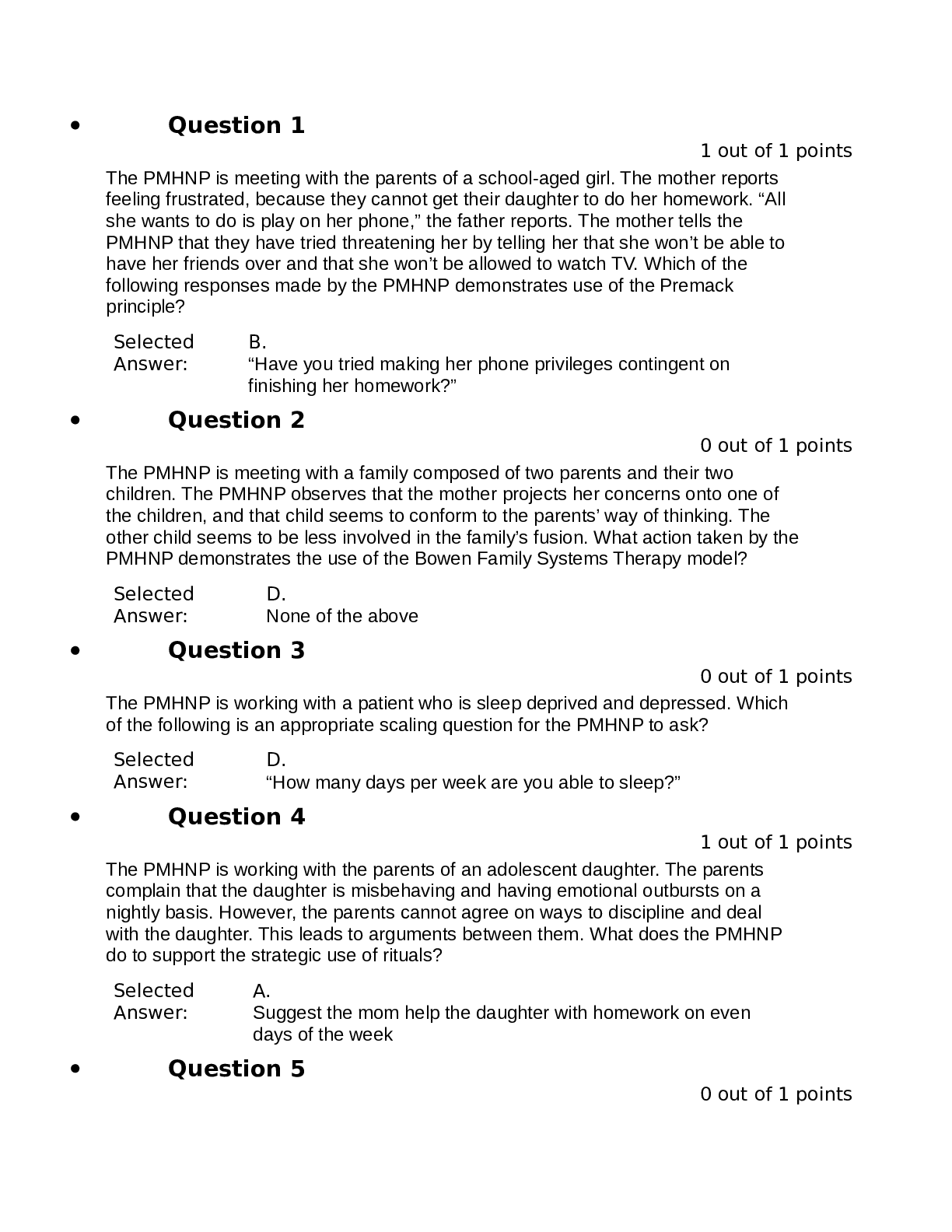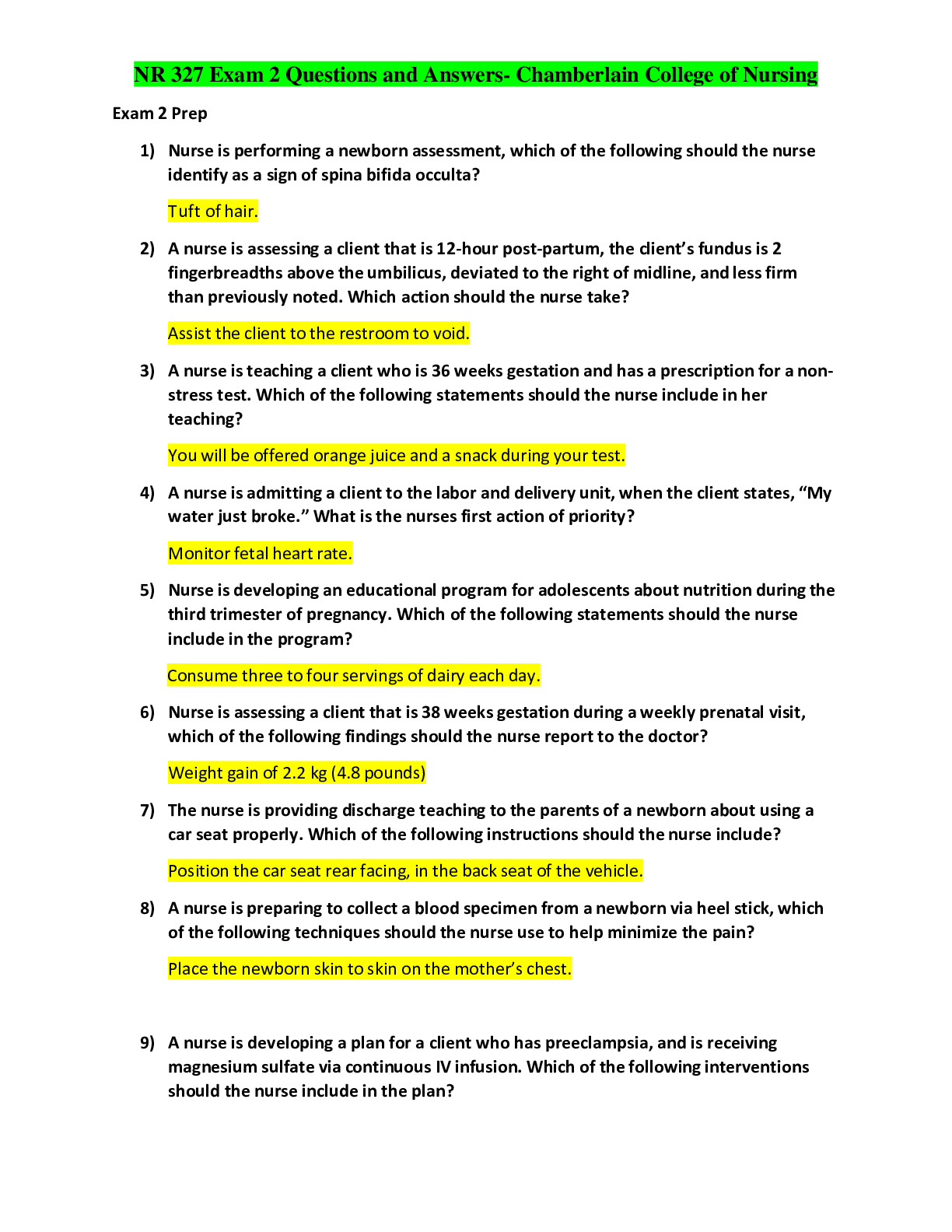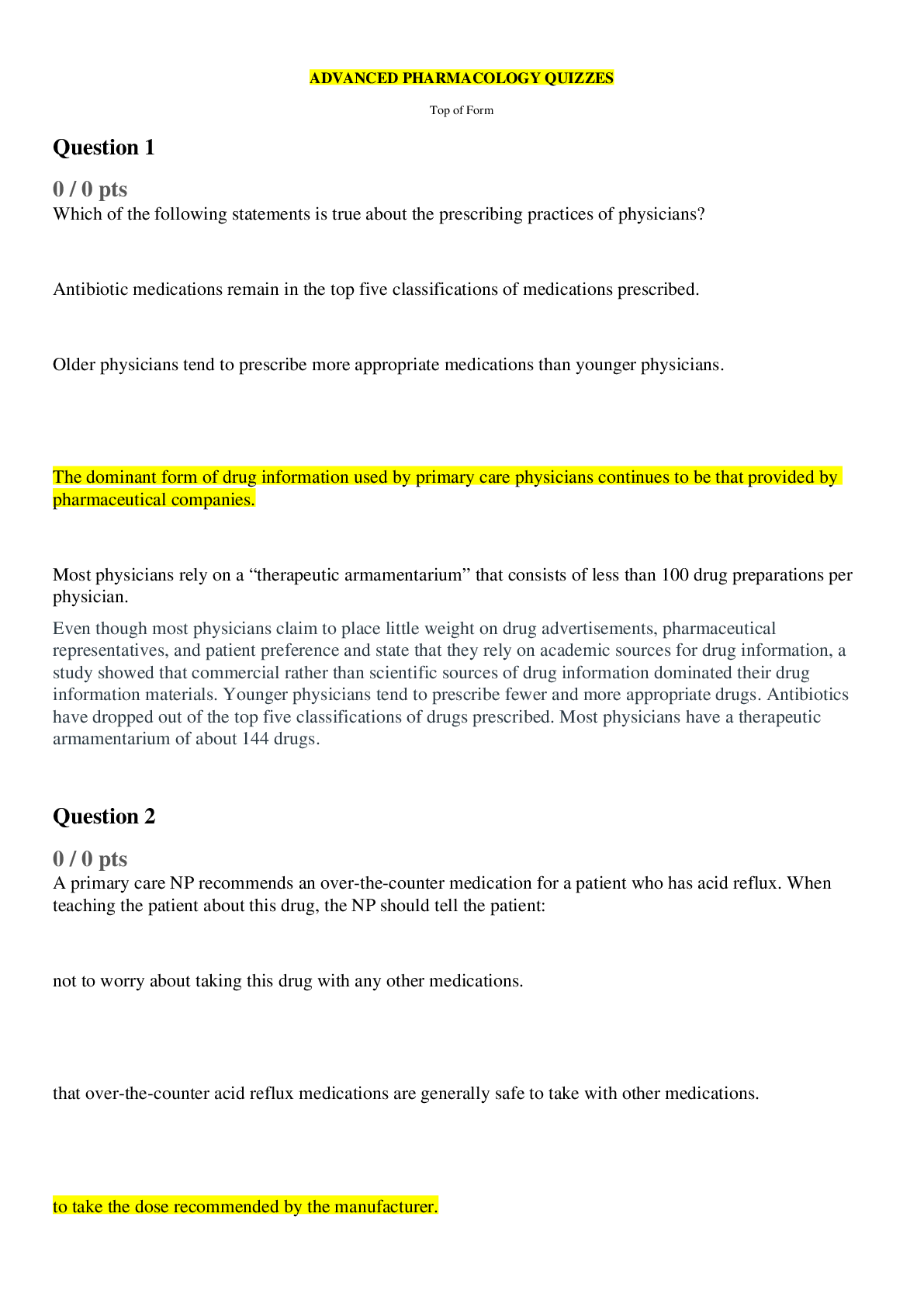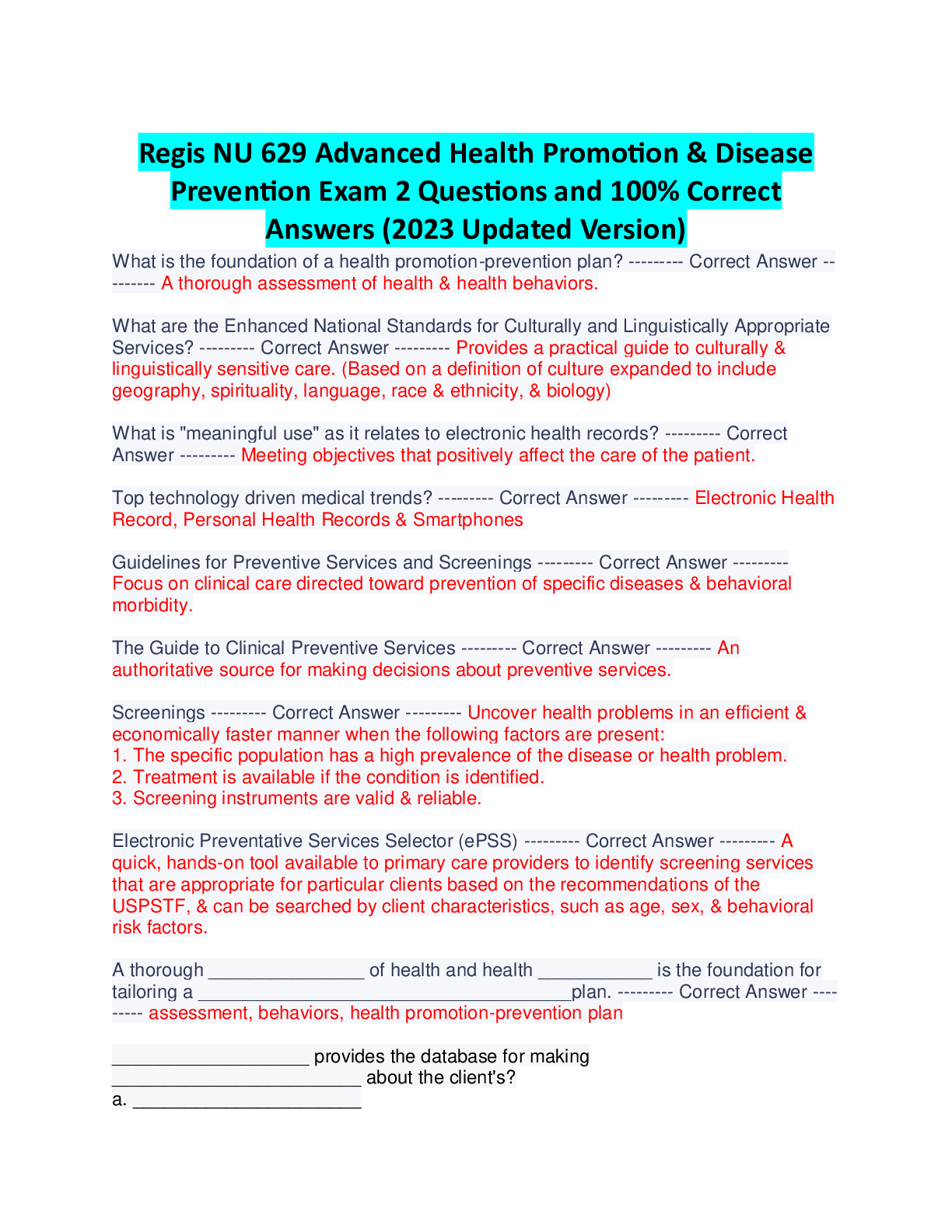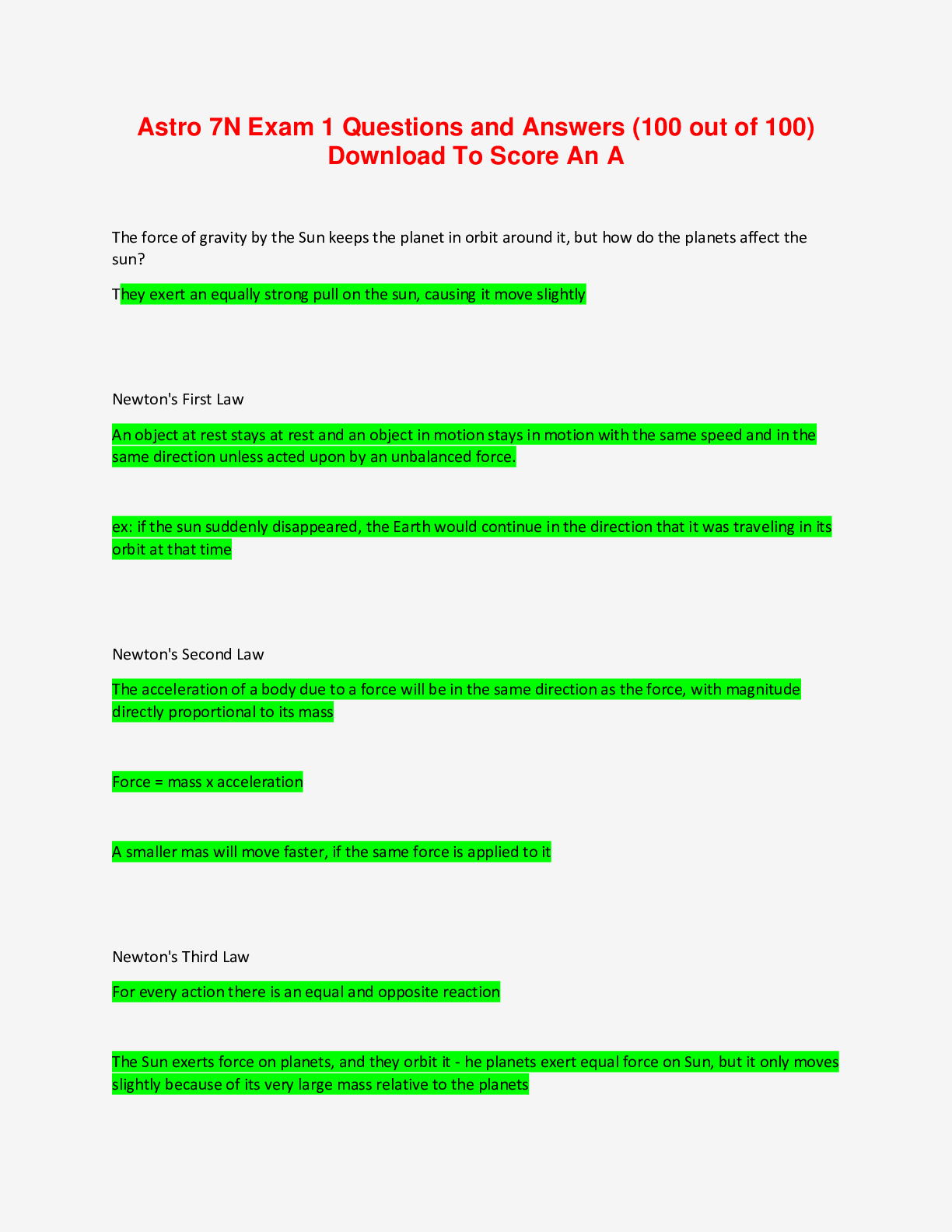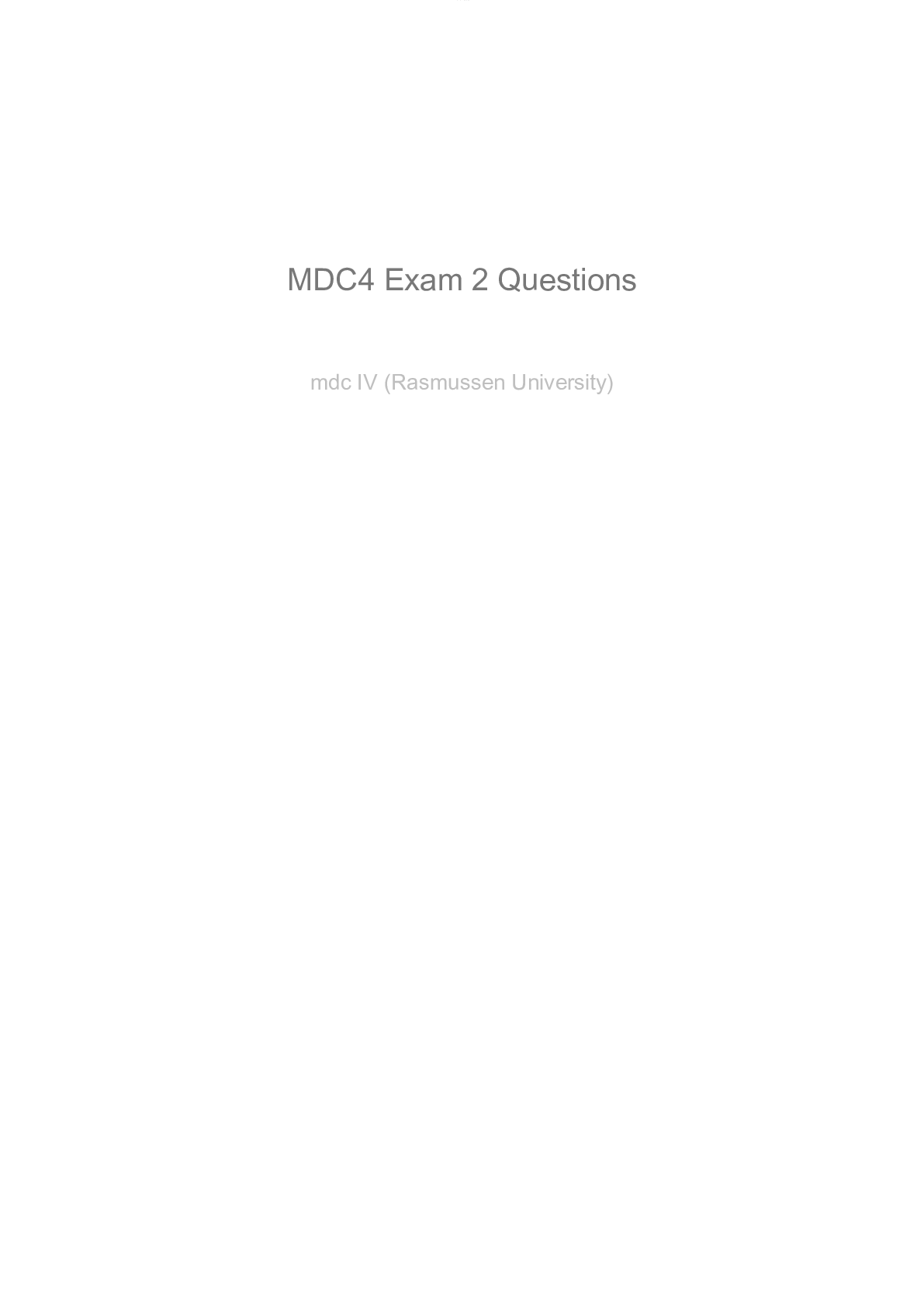Philosophy > EXAM > PHIL 2306 EXAM 2/PHIL 2306 EXAM 2 Questions And Answers (Download To Score An A) (All)
PHIL 2306 EXAM 2/PHIL 2306 EXAM 2 Questions And Answers (Download To Score An A)
Document Content and Description Below
PHIL 2306 EXAM 2 QUESTION 1 According to Kant, an action is morally acceptable if and only if It maximizes happiness. Its maxim is universalizable. Its maxim is accepted in society. It is in ac... cordance with the golden rule. QUESTION 2 According to Kant, the demands of morality are Categorical imperatives. Hypothetical imperatives. Created by God. The products of social convention. QUESTION 3 A prisoner's dilemma is a situation in which All people benefit if all people refrain from pursuing their short-term interests. All people benefit if all people pursue their short-term interests. Every possible course of action ends up harming everyone. There is no possible action that does not break the law. QUESTION 4 Hobbes claimed that life in a state of nature would be Free and easy. Difficult but safe. A war of all against all. Characterized by moral virtue. QUESTION 5 Contractarianism states that actions are morally right if and only if Everyone agrees that they are right. They do not violate any agreements. They do not violate anyone's rights. They are permitted by rules that free, equal, and rational people would agree to live by. QUESTION 6 What is Rawls'veil of ignorance? A metaphorical term for the way humans often fail to empathize with one another. A description of the tools used by governments to keep their people ignorant. An imaginary device that erases all knowledge of your distinctive traits. An objection to contractarianism. QUESTION 7 According to Hobbes, what is the fundamental reason for acting? Self- interest Altruism Virtue Fear of God QUESTION 8 Situations in which one person can benefit from the common good without contributing anything are sometimes referred to as Prisoner's Dilemmas. Free-rider problems. Paradoxes of hedonism. Contractarian problematics. QUESTION 9 Which of these is not a prima facie duty identified by Ross? Nonmalefice nce Beneficence Chastity Reparations QUESTION 10 How does Ross think we can know our prima facie duties? By deducing them from other moral principles They are self-evident. Through a process of circular reasoning. None of the above - He does not think we can know prima facie duties QUESTION 11 How does Ross think that we can know what the right thing to do is when our prima facie duties conflict? By deducing it from other principles It is self-evident Through a process of circular reasoning None of the above - Ross says there is no mechanical procedure for determining which actions are right and wrong QUESTION 12 According to virtue ethics, the fundamental moral question is: What kinds of things are intrinsically good? What is the right think to do? What kind of person should I be? What would benefit me th most? QUESTION 13 In the West, virtue ethics traces its origins back to Aristotle. Immanueal Kant. Thomas Hobbes. W.D. Ross. QUESTION 14 One common objection to virtue ethics is: It is too demanding. It does not give adequate guidance about what to do. It does not provide a way for determining who our role models should be. All of the above. QUESTION 15 How did Aristotle think that virtue could be acquired? It is inborn. One must have a conversion experience in which one experiences the good directly. Through education and training. It is impossible to become truly virtuous. QUESTION 16 What do people seek above all else, according to Aristotle? Eudaimo nia Ataraxia Pleasure Power QUESTION 17 Feminist ethics claims that Men and women should always be treated the same under any circumstance. The experiences of women are vital to the full understanding of reality. There are no innate differences betwen men and women. All of the above. QUESTION 18 In her 1982 book,A Different Voice, Carol Gilligan claimed that Women are innately more compassionate than men. All women share a common approach to morality. Men tend to be more morally developed than women. Women tend to respond to moral conflict differently than men. QUESTION 19 According to feminist ethics, emotions Are central to moral motivation and moral discovery. Motivate us to act morally but do not help us to discover how we should act. Usually distort our views about morality in negative ways. Are irrelevant to morality. QUESTION 20 One challenge for feminist ethics is that Some moral rules have exceptions. Sometimes it is appropriate to treat men and women differently. It does not give concrete guidance about how to resolve moral conflicts. Partiality is sometimes justified. QUESTION 21 Objective moral standards are Those that all moral theories agree upon. Those that apply to everyone, regardless of what they believe. Those that are knowable to all. Those that everyone objects to. QUESTION 22 Someone is a cultural relativist is he or she believes that Different cultures have different moral codes. The moral code of our society is a fallible guide to our moral obligations. The guiding ideals of a society determine what is right and wrong. Our culture's basic moral code is worse than those of at least some other cultures. QUESTION 23 Accordign to ethical subjectivism, whether an act is right or wrong is determined by Cultural approval. The consequences of an action. Universalizability. Personal approval. QUESTION 24 Which of the following would an ethical objectivist accept? Morality is determined by the guiding ideals of society. Morality is determined by personal opinion. There are no moral truths at all. Some moral standards apply to everyone. QUESTION 25 Which of the following would a cultural relativist accept? Morality is determined by the guiding ideals of society. Morality is determined by personal opinion. There are no moral truths at all. Some moral standards apply to everyone. QUESTION 26 Moral nihilists believe Facts exist but values do not. Values exist but facts do not. Both facts and values exist. Neither facts nor values exist. QUESTION 27 The two main types of moral nihilism are: Relativism and subjectivism. Monism and pluralism. Expressivism and error theory. Skepticism and dogmatism. QUESTION 28 Both expressivists and error theorists believe that Moral judgments are attemots to describe the moral features of things. No moral claims are true. Some moral claims are true. The point of moral judgments is to vent our emotions. QUESTION 29 In expressivism, a sincere moral judgment is Always true. Always false. Sometimes true and sometimes false. A kind of emotional venting. QUESTION 30 Kant's principle of humanity states It is never permissible to kill an innocent human being. Always treat a human being as an end, never as a mere means. Act only on maxims that can be applied to all of humanity. All human beings, even those that lack rationality and autonomy, are equally valuable. QUESTION 31 What might be a problem for Kant's principle of humanity? The notion of treating someone as an end is vague and difficult to apply. It doesn't deal with ethics toward animals. Sometimes it is permissible to kill a human being. There is nothing that can be applied to all humanity. QUESTION 32 Prisoner's dilemmas are Purely hypothetical examples used in philosophy. Historical examples about problems people faced in jails. Moral problems that occur in jails. Situations that often occur in the real world. QUESTION 33 What did Hobbes think is the only way to escape from the condition in which there is no government to maintain order? For each person, individually, to strive to morally improve himself. For people to accept a religious faith. To mutually agree on a set of rules for social cooperation. Hobbes did not think that such a condition could truly be escaped. QUESTION 34 Which of the following is a problem for the idea of the veil of ignorance? It is unclear why we should follow agreements made by people unlike us. It renders the agreements of the contractors unfair. It assures that the contractors will disagree among themselves. It encourages ignorance of the law. QUESTION 35 What question best describes the Priority Problem for virtue ethics? How do we know what duties are a priority? Should I put my desires prior to other people's? Are actions morally right because virtuous people perform them, or do virtuous people perform them because they are morally right? Is the state prior to the individual or is the individual prior to the state? QUESTION 36 The Categorical Imperative was developed by Aristotle. True False QUESTION 37 Moral nihilism claims that there are moral truths. True False QUESTION 38 Kant claimed that the only actions that possess moral worth are actions performed from the good will. True False QUESTION 39 Hobbes described his vision of the state of nature as "solitary, poor, nasty, brutish, and short." True False QUESTION 40 According to the feminist ethic, traits traditionally associated with women are competitiveness, independence, demanding one's fair share, and insistence on personal honor. True False QUESTION 41 One implication for ethical relativism is that it would be impossible for personal opinions or cultural ideas to ever be mistaken. True False QUESTION 42 Kant's theory of ethics would be best described as a conseuentialist theory. True False QUESTION 43 W.D. Ross states that moral rules come from a higher being. True False QUESTION 44 Moral skepticism claims that we can have knowledge of objective moral rules. True False QUESTION 45 In philosophy, anideal observer is a fully informed and perfectly rational version of oneself. True False QUESTION 46 In expressivism, moral judgments express our feelings. True False QUESTION 47 Carol Gilligan invented the idea of the veil of ignorance? True False QUESTION 48 John Rawls is a social contract theorist. True False QUESTION 49 A Prima Facie duty is defined as an excellent, permanent, absolute reason to do or refrain from doing something. True False QUESTION 50 One problem for virtue ethics is the question of how do we choose the correct role models. True False [Show More]
Last updated: 1 year ago
Preview 1 out of 11 pages
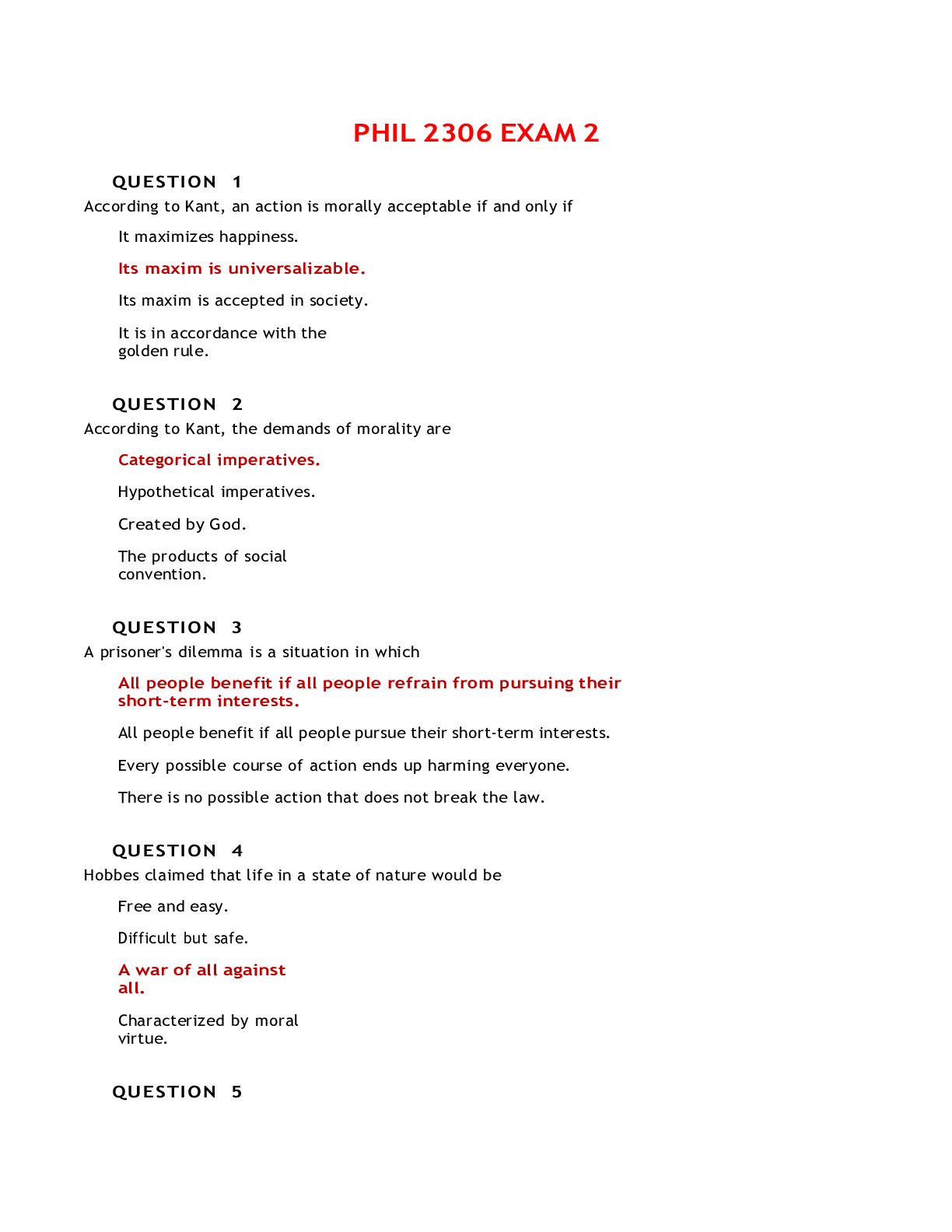
Reviews( 2 )

by davidj2036 · 3 years ago
woow great...wish you success by Good grade. 3 years ago

by Good grade · 3 years ago
Document information
Connected school, study & course
About the document
Uploaded On
Mar 31, 2021
Number of pages
11
Written in
Additional information
This document has been written for:
Uploaded
Mar 31, 2021
Downloads
1
Views
65

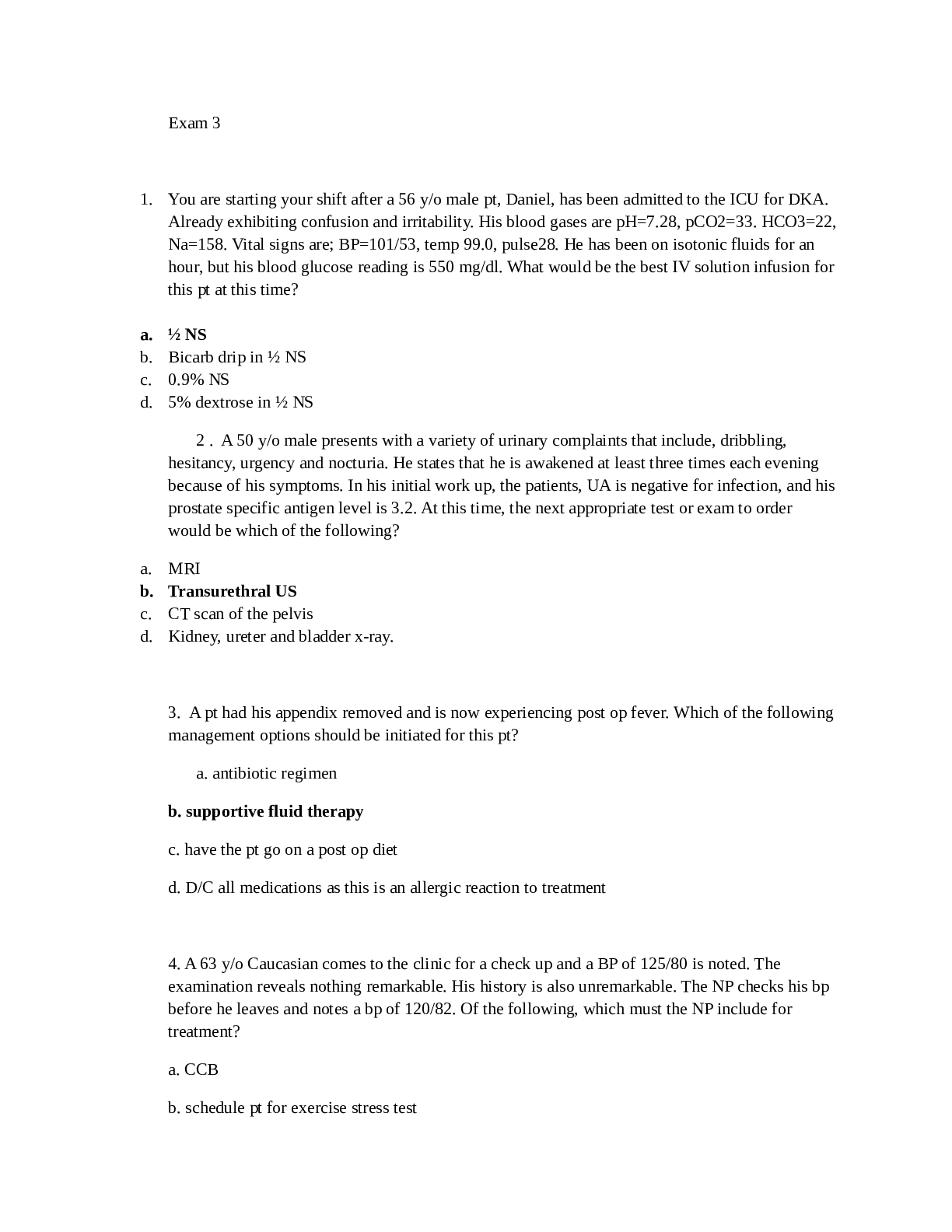

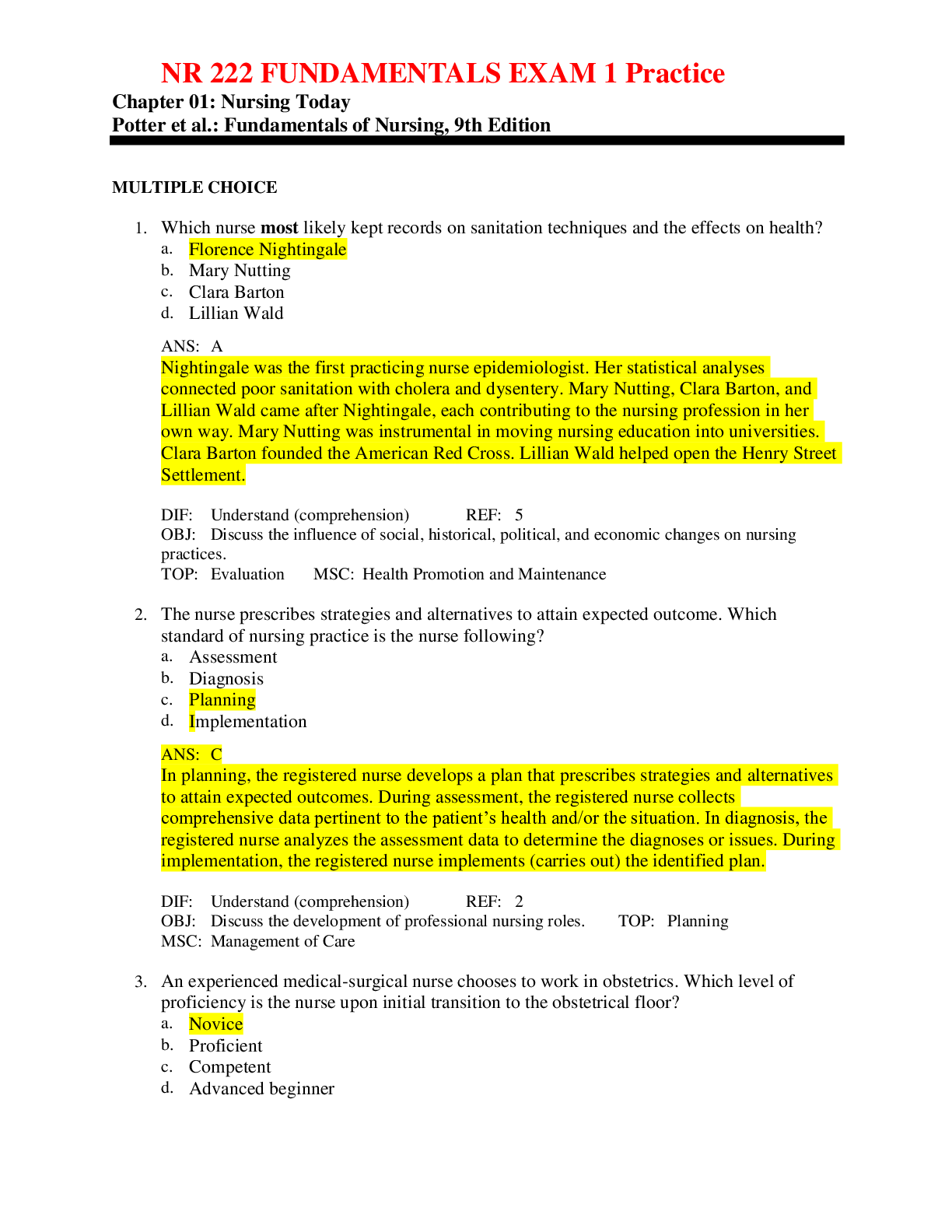

.png)
